LSC UoS BA Business: Contemporary Management Issues Case Study
VerifiedAdded on 2023/06/09
|7
|1725
|399
Case Study
AI Summary
This case study examines contemporary management issues in the 21st century, focusing on the effectiveness of Shackleton's leadership style in addressing organizational challenges. It uses Unilever as an example, highlighting issues like poor organizational culture, low employee motivation, and weak leadership. The study recommends adopting Shackleton's leadership principles to improve employee engagement, foster better communication, and enhance overall productivity. It emphasizes the importance of modifying organizational culture, providing adequate training, and promoting employee well-being to retain talent and achieve success in a dynamic business environment. The case study concludes that addressing these issues through effective leadership and organizational changes can significantly improve a company's profitability and market share. Desklib provides a platform for students to access this and other solved assignments for learning and research.
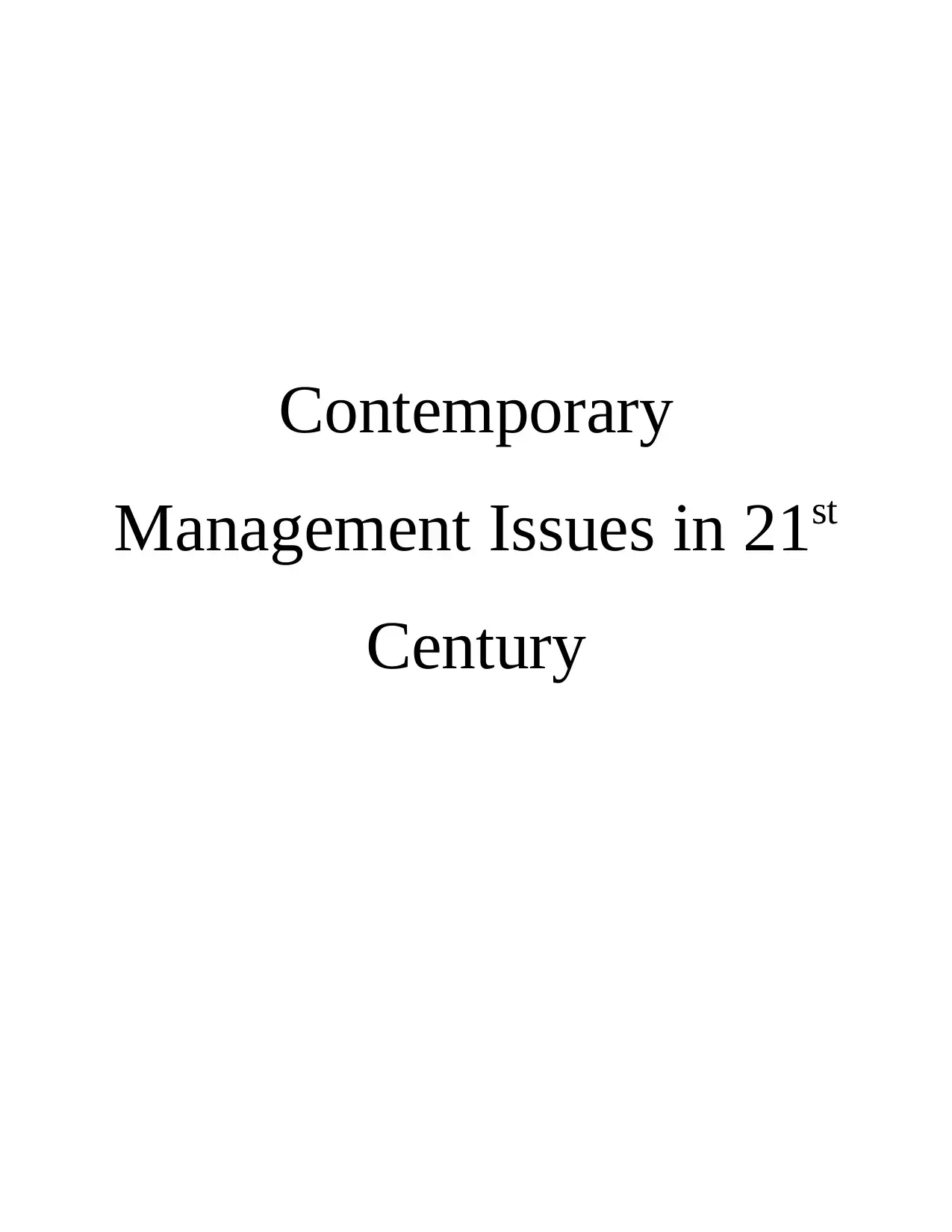
Contemporary
Management Issues in 21st
Century
Management Issues in 21st
Century
Paraphrase This Document
Need a fresh take? Get an instant paraphrase of this document with our AI Paraphraser
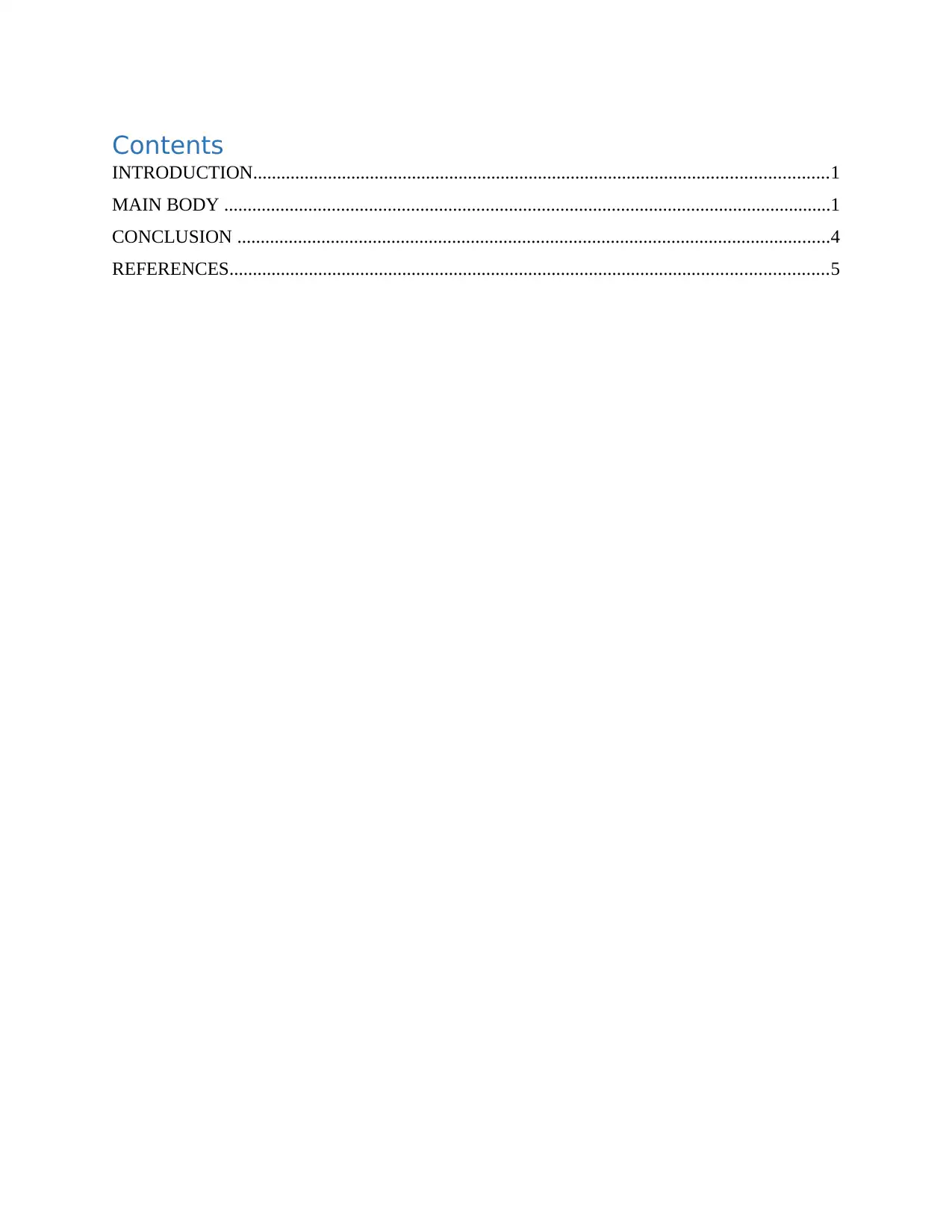
Contents
INTRODUCTION...........................................................................................................................1
MAIN BODY ..................................................................................................................................1
CONCLUSION ...............................................................................................................................4
REFERENCES................................................................................................................................5
INTRODUCTION...........................................................................................................................1
MAIN BODY ..................................................................................................................................1
CONCLUSION ...............................................................................................................................4
REFERENCES................................................................................................................................5
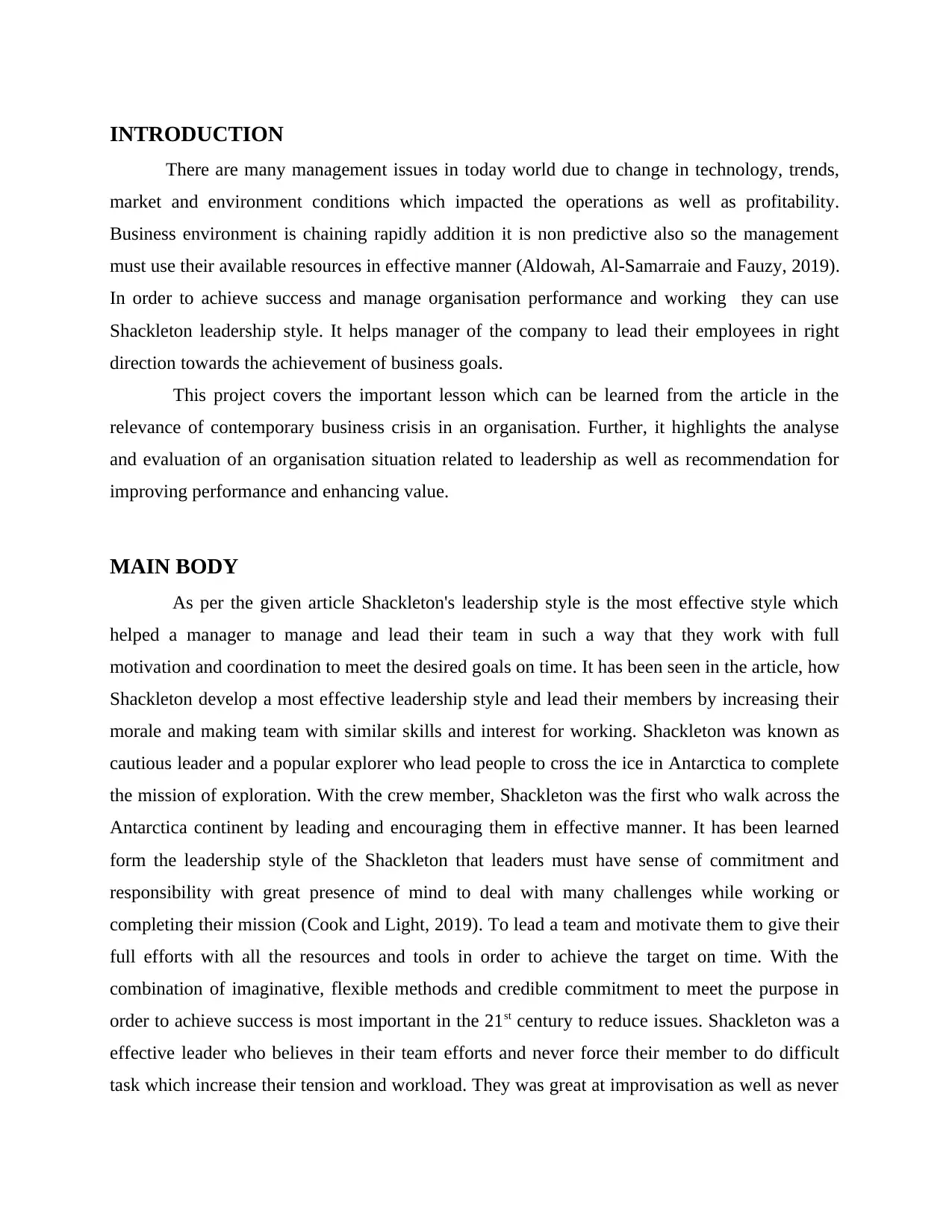
INTRODUCTION
There are many management issues in today world due to change in technology, trends,
market and environment conditions which impacted the operations as well as profitability.
Business environment is chaining rapidly addition it is non predictive also so the management
must use their available resources in effective manner (Aldowah, Al-Samarraie and Fauzy, 2019).
In order to achieve success and manage organisation performance and working they can use
Shackleton leadership style. It helps manager of the company to lead their employees in right
direction towards the achievement of business goals.
This project covers the important lesson which can be learned from the article in the
relevance of contemporary business crisis in an organisation. Further, it highlights the analyse
and evaluation of an organisation situation related to leadership as well as recommendation for
improving performance and enhancing value.
MAIN BODY
As per the given article Shackleton's leadership style is the most effective style which
helped a manager to manage and lead their team in such a way that they work with full
motivation and coordination to meet the desired goals on time. It has been seen in the article, how
Shackleton develop a most effective leadership style and lead their members by increasing their
morale and making team with similar skills and interest for working. Shackleton was known as
cautious leader and a popular explorer who lead people to cross the ice in Antarctica to complete
the mission of exploration. With the crew member, Shackleton was the first who walk across the
Antarctica continent by leading and encouraging them in effective manner. It has been learned
form the leadership style of the Shackleton that leaders must have sense of commitment and
responsibility with great presence of mind to deal with many challenges while working or
completing their mission (Cook and Light, 2019). To lead a team and motivate them to give their
full efforts with all the resources and tools in order to achieve the target on time. With the
combination of imaginative, flexible methods and credible commitment to meet the purpose in
order to achieve success is most important in the 21st century to reduce issues. Shackleton was a
effective leader who believes in their team efforts and never force their member to do difficult
task which increase their tension and workload. They was great at improvisation as well as never
There are many management issues in today world due to change in technology, trends,
market and environment conditions which impacted the operations as well as profitability.
Business environment is chaining rapidly addition it is non predictive also so the management
must use their available resources in effective manner (Aldowah, Al-Samarraie and Fauzy, 2019).
In order to achieve success and manage organisation performance and working they can use
Shackleton leadership style. It helps manager of the company to lead their employees in right
direction towards the achievement of business goals.
This project covers the important lesson which can be learned from the article in the
relevance of contemporary business crisis in an organisation. Further, it highlights the analyse
and evaluation of an organisation situation related to leadership as well as recommendation for
improving performance and enhancing value.
MAIN BODY
As per the given article Shackleton's leadership style is the most effective style which
helped a manager to manage and lead their team in such a way that they work with full
motivation and coordination to meet the desired goals on time. It has been seen in the article, how
Shackleton develop a most effective leadership style and lead their members by increasing their
morale and making team with similar skills and interest for working. Shackleton was known as
cautious leader and a popular explorer who lead people to cross the ice in Antarctica to complete
the mission of exploration. With the crew member, Shackleton was the first who walk across the
Antarctica continent by leading and encouraging them in effective manner. It has been learned
form the leadership style of the Shackleton that leaders must have sense of commitment and
responsibility with great presence of mind to deal with many challenges while working or
completing their mission (Cook and Light, 2019). To lead a team and motivate them to give their
full efforts with all the resources and tools in order to achieve the target on time. With the
combination of imaginative, flexible methods and credible commitment to meet the purpose in
order to achieve success is most important in the 21st century to reduce issues. Shackleton was a
effective leader who believes in their team efforts and never force their member to do difficult
task which increase their tension and workload. They was great at improvisation as well as never
⊘ This is a preview!⊘
Do you want full access?
Subscribe today to unlock all pages.

Trusted by 1+ million students worldwide
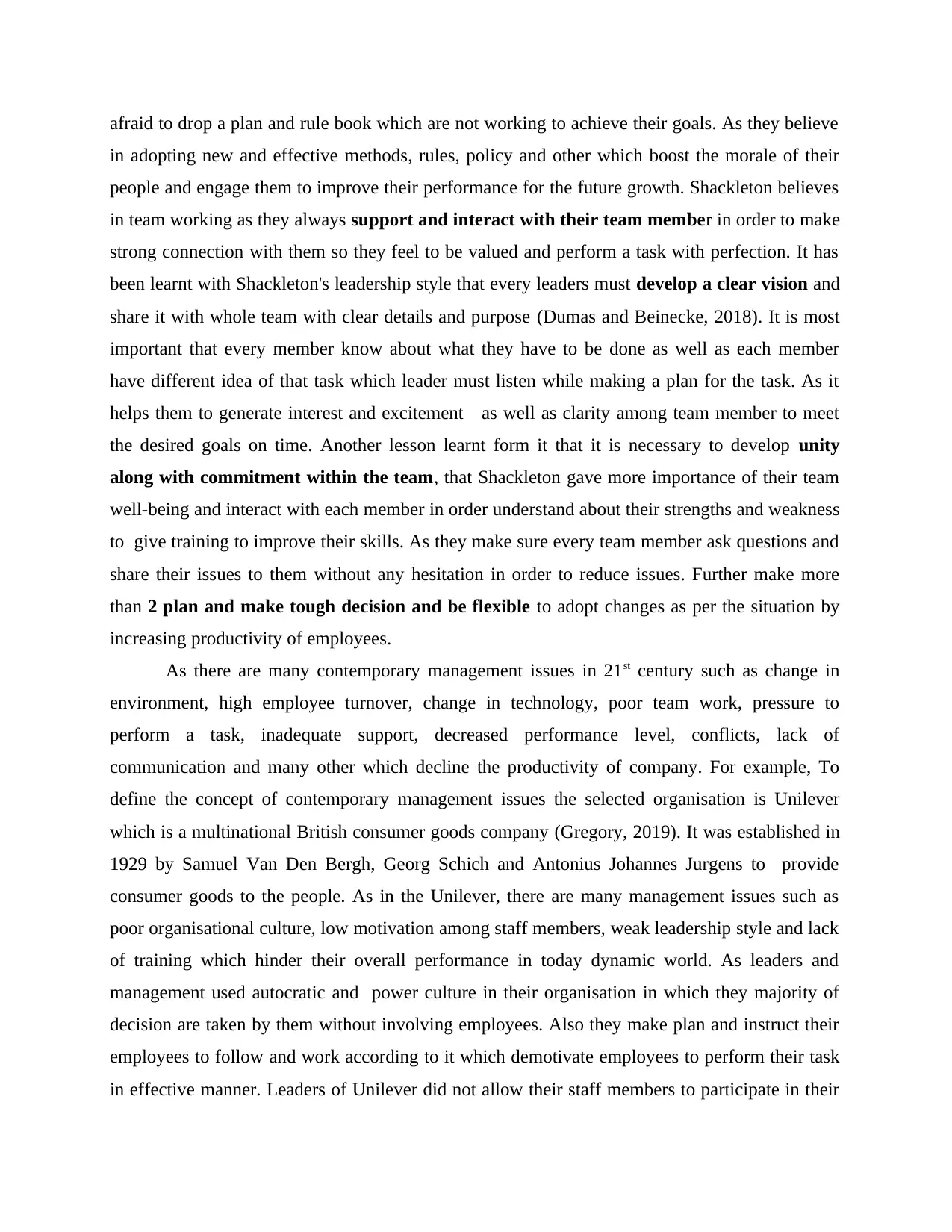
afraid to drop a plan and rule book which are not working to achieve their goals. As they believe
in adopting new and effective methods, rules, policy and other which boost the morale of their
people and engage them to improve their performance for the future growth. Shackleton believes
in team working as they always support and interact with their team member in order to make
strong connection with them so they feel to be valued and perform a task with perfection. It has
been learnt with Shackleton's leadership style that every leaders must develop a clear vision and
share it with whole team with clear details and purpose (Dumas and Beinecke, 2018). It is most
important that every member know about what they have to be done as well as each member
have different idea of that task which leader must listen while making a plan for the task. As it
helps them to generate interest and excitement as well as clarity among team member to meet
the desired goals on time. Another lesson learnt form it that it is necessary to develop unity
along with commitment within the team, that Shackleton gave more importance of their team
well-being and interact with each member in order understand about their strengths and weakness
to give training to improve their skills. As they make sure every team member ask questions and
share their issues to them without any hesitation in order to reduce issues. Further make more
than 2 plan and make tough decision and be flexible to adopt changes as per the situation by
increasing productivity of employees.
As there are many contemporary management issues in 21st century such as change in
environment, high employee turnover, change in technology, poor team work, pressure to
perform a task, inadequate support, decreased performance level, conflicts, lack of
communication and many other which decline the productivity of company. For example, To
define the concept of contemporary management issues the selected organisation is Unilever
which is a multinational British consumer goods company (Gregory, 2019). It was established in
1929 by Samuel Van Den Bergh, Georg Schich and Antonius Johannes Jurgens to provide
consumer goods to the people. As in the Unilever, there are many management issues such as
poor organisational culture, low motivation among staff members, weak leadership style and lack
of training which hinder their overall performance in today dynamic world. As leaders and
management used autocratic and power culture in their organisation in which they majority of
decision are taken by them without involving employees. Also they make plan and instruct their
employees to follow and work according to it which demotivate employees to perform their task
in effective manner. Leaders of Unilever did not allow their staff members to participate in their
in adopting new and effective methods, rules, policy and other which boost the morale of their
people and engage them to improve their performance for the future growth. Shackleton believes
in team working as they always support and interact with their team member in order to make
strong connection with them so they feel to be valued and perform a task with perfection. It has
been learnt with Shackleton's leadership style that every leaders must develop a clear vision and
share it with whole team with clear details and purpose (Dumas and Beinecke, 2018). It is most
important that every member know about what they have to be done as well as each member
have different idea of that task which leader must listen while making a plan for the task. As it
helps them to generate interest and excitement as well as clarity among team member to meet
the desired goals on time. Another lesson learnt form it that it is necessary to develop unity
along with commitment within the team, that Shackleton gave more importance of their team
well-being and interact with each member in order understand about their strengths and weakness
to give training to improve their skills. As they make sure every team member ask questions and
share their issues to them without any hesitation in order to reduce issues. Further make more
than 2 plan and make tough decision and be flexible to adopt changes as per the situation by
increasing productivity of employees.
As there are many contemporary management issues in 21st century such as change in
environment, high employee turnover, change in technology, poor team work, pressure to
perform a task, inadequate support, decreased performance level, conflicts, lack of
communication and many other which decline the productivity of company. For example, To
define the concept of contemporary management issues the selected organisation is Unilever
which is a multinational British consumer goods company (Gregory, 2019). It was established in
1929 by Samuel Van Den Bergh, Georg Schich and Antonius Johannes Jurgens to provide
consumer goods to the people. As in the Unilever, there are many management issues such as
poor organisational culture, low motivation among staff members, weak leadership style and lack
of training which hinder their overall performance in today dynamic world. As leaders and
management used autocratic and power culture in their organisation in which they majority of
decision are taken by them without involving employees. Also they make plan and instruct their
employees to follow and work according to it which demotivate employees to perform their task
in effective manner. Leaders of Unilever did not allow their staff members to participate in their
Paraphrase This Document
Need a fresh take? Get an instant paraphrase of this document with our AI Paraphraser
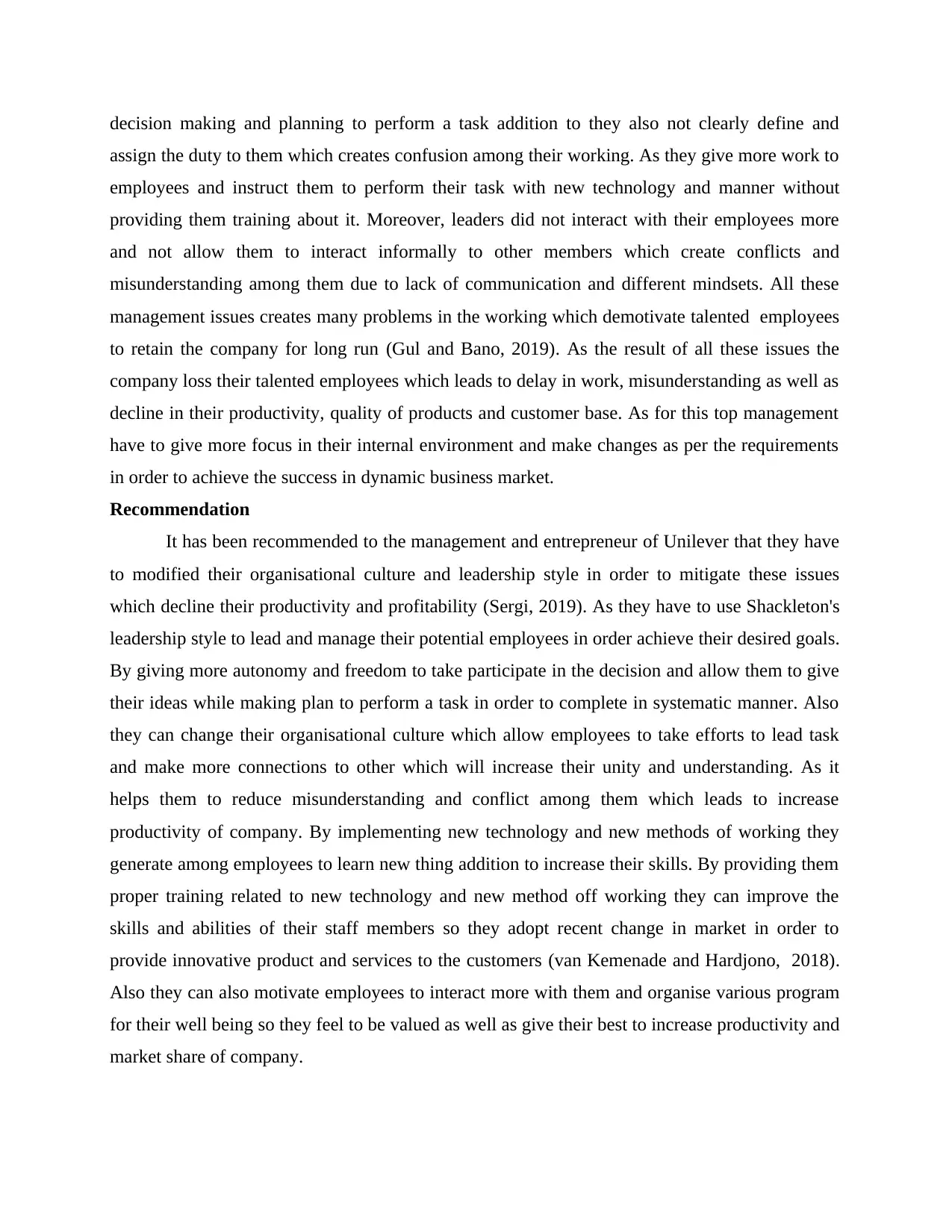
decision making and planning to perform a task addition to they also not clearly define and
assign the duty to them which creates confusion among their working. As they give more work to
employees and instruct them to perform their task with new technology and manner without
providing them training about it. Moreover, leaders did not interact with their employees more
and not allow them to interact informally to other members which create conflicts and
misunderstanding among them due to lack of communication and different mindsets. All these
management issues creates many problems in the working which demotivate talented employees
to retain the company for long run (Gul and Bano, 2019). As the result of all these issues the
company loss their talented employees which leads to delay in work, misunderstanding as well as
decline in their productivity, quality of products and customer base. As for this top management
have to give more focus in their internal environment and make changes as per the requirements
in order to achieve the success in dynamic business market.
Recommendation
It has been recommended to the management and entrepreneur of Unilever that they have
to modified their organisational culture and leadership style in order to mitigate these issues
which decline their productivity and profitability (Sergi, 2019). As they have to use Shackleton's
leadership style to lead and manage their potential employees in order achieve their desired goals.
By giving more autonomy and freedom to take participate in the decision and allow them to give
their ideas while making plan to perform a task in order to complete in systematic manner. Also
they can change their organisational culture which allow employees to take efforts to lead task
and make more connections to other which will increase their unity and understanding. As it
helps them to reduce misunderstanding and conflict among them which leads to increase
productivity of company. By implementing new technology and new methods of working they
generate among employees to learn new thing addition to increase their skills. By providing them
proper training related to new technology and new method off working they can improve the
skills and abilities of their staff members so they adopt recent change in market in order to
provide innovative product and services to the customers (van Kemenade and Hardjono, 2018).
Also they can also motivate employees to interact more with them and organise various program
for their well being so they feel to be valued as well as give their best to increase productivity and
market share of company.
assign the duty to them which creates confusion among their working. As they give more work to
employees and instruct them to perform their task with new technology and manner without
providing them training about it. Moreover, leaders did not interact with their employees more
and not allow them to interact informally to other members which create conflicts and
misunderstanding among them due to lack of communication and different mindsets. All these
management issues creates many problems in the working which demotivate talented employees
to retain the company for long run (Gul and Bano, 2019). As the result of all these issues the
company loss their talented employees which leads to delay in work, misunderstanding as well as
decline in their productivity, quality of products and customer base. As for this top management
have to give more focus in their internal environment and make changes as per the requirements
in order to achieve the success in dynamic business market.
Recommendation
It has been recommended to the management and entrepreneur of Unilever that they have
to modified their organisational culture and leadership style in order to mitigate these issues
which decline their productivity and profitability (Sergi, 2019). As they have to use Shackleton's
leadership style to lead and manage their potential employees in order achieve their desired goals.
By giving more autonomy and freedom to take participate in the decision and allow them to give
their ideas while making plan to perform a task in order to complete in systematic manner. Also
they can change their organisational culture which allow employees to take efforts to lead task
and make more connections to other which will increase their unity and understanding. As it
helps them to reduce misunderstanding and conflict among them which leads to increase
productivity of company. By implementing new technology and new methods of working they
generate among employees to learn new thing addition to increase their skills. By providing them
proper training related to new technology and new method off working they can improve the
skills and abilities of their staff members so they adopt recent change in market in order to
provide innovative product and services to the customers (van Kemenade and Hardjono, 2018).
Also they can also motivate employees to interact more with them and organise various program
for their well being so they feel to be valued as well as give their best to increase productivity and
market share of company.
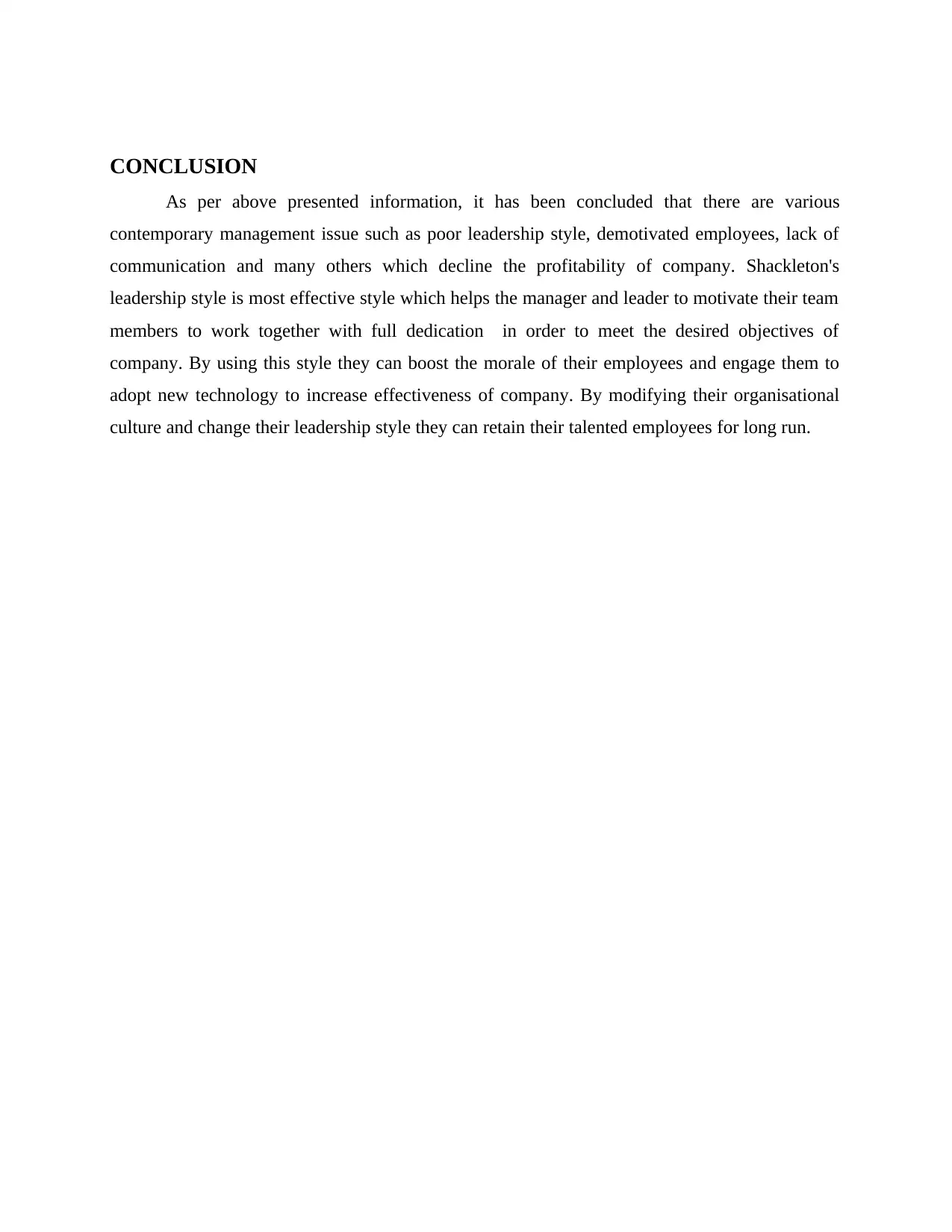
CONCLUSION
As per above presented information, it has been concluded that there are various
contemporary management issue such as poor leadership style, demotivated employees, lack of
communication and many others which decline the profitability of company. Shackleton's
leadership style is most effective style which helps the manager and leader to motivate their team
members to work together with full dedication in order to meet the desired objectives of
company. By using this style they can boost the morale of their employees and engage them to
adopt new technology to increase effectiveness of company. By modifying their organisational
culture and change their leadership style they can retain their talented employees for long run.
As per above presented information, it has been concluded that there are various
contemporary management issue such as poor leadership style, demotivated employees, lack of
communication and many others which decline the profitability of company. Shackleton's
leadership style is most effective style which helps the manager and leader to motivate their team
members to work together with full dedication in order to meet the desired objectives of
company. By using this style they can boost the morale of their employees and engage them to
adopt new technology to increase effectiveness of company. By modifying their organisational
culture and change their leadership style they can retain their talented employees for long run.
⊘ This is a preview!⊘
Do you want full access?
Subscribe today to unlock all pages.

Trusted by 1+ million students worldwide
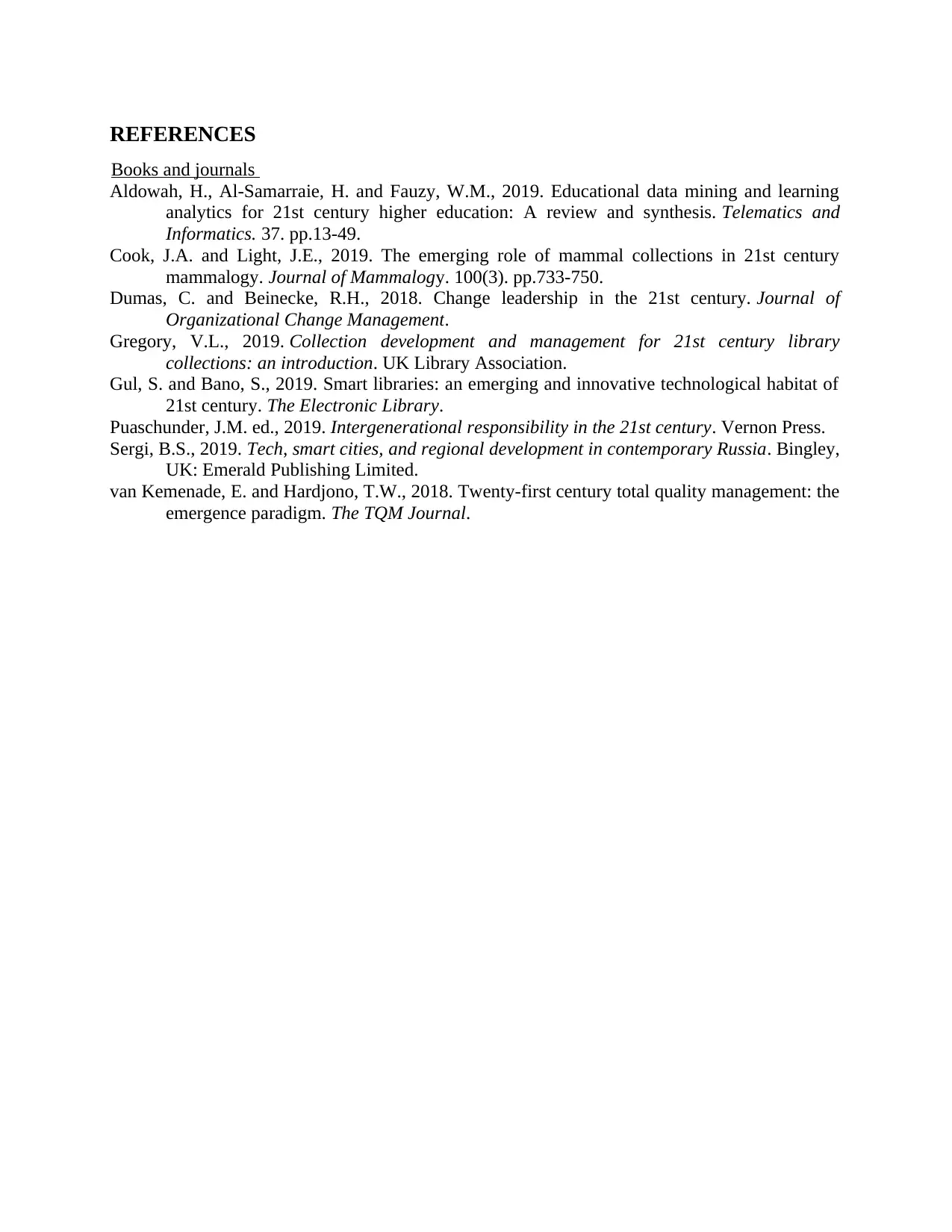
REFERENCES
Books and journals
Aldowah, H., Al-Samarraie, H. and Fauzy, W.M., 2019. Educational data mining and learning
analytics for 21st century higher education: A review and synthesis. Telematics and
Informatics. 37. pp.13-49.
Cook, J.A. and Light, J.E., 2019. The emerging role of mammal collections in 21st century
mammalogy. Journal of Mammalogy. 100(3). pp.733-750.
Dumas, C. and Beinecke, R.H., 2018. Change leadership in the 21st century. Journal of
Organizational Change Management.
Gregory, V.L., 2019. Collection development and management for 21st century library
collections: an introduction. UK Library Association.
Gul, S. and Bano, S., 2019. Smart libraries: an emerging and innovative technological habitat of
21st century. The Electronic Library.
Puaschunder, J.M. ed., 2019. Intergenerational responsibility in the 21st century. Vernon Press.
Sergi, B.S., 2019. Tech, smart cities, and regional development in contemporary Russia. Bingley,
UK: Emerald Publishing Limited.
van Kemenade, E. and Hardjono, T.W., 2018. Twenty-first century total quality management: the
emergence paradigm. The TQM Journal.
Books and journals
Aldowah, H., Al-Samarraie, H. and Fauzy, W.M., 2019. Educational data mining and learning
analytics for 21st century higher education: A review and synthesis. Telematics and
Informatics. 37. pp.13-49.
Cook, J.A. and Light, J.E., 2019. The emerging role of mammal collections in 21st century
mammalogy. Journal of Mammalogy. 100(3). pp.733-750.
Dumas, C. and Beinecke, R.H., 2018. Change leadership in the 21st century. Journal of
Organizational Change Management.
Gregory, V.L., 2019. Collection development and management for 21st century library
collections: an introduction. UK Library Association.
Gul, S. and Bano, S., 2019. Smart libraries: an emerging and innovative technological habitat of
21st century. The Electronic Library.
Puaschunder, J.M. ed., 2019. Intergenerational responsibility in the 21st century. Vernon Press.
Sergi, B.S., 2019. Tech, smart cities, and regional development in contemporary Russia. Bingley,
UK: Emerald Publishing Limited.
van Kemenade, E. and Hardjono, T.W., 2018. Twenty-first century total quality management: the
emergence paradigm. The TQM Journal.
1 out of 7
Related Documents
Your All-in-One AI-Powered Toolkit for Academic Success.
+13062052269
info@desklib.com
Available 24*7 on WhatsApp / Email
![[object Object]](/_next/static/media/star-bottom.7253800d.svg)
Unlock your academic potential
Copyright © 2020–2026 A2Z Services. All Rights Reserved. Developed and managed by ZUCOL.

